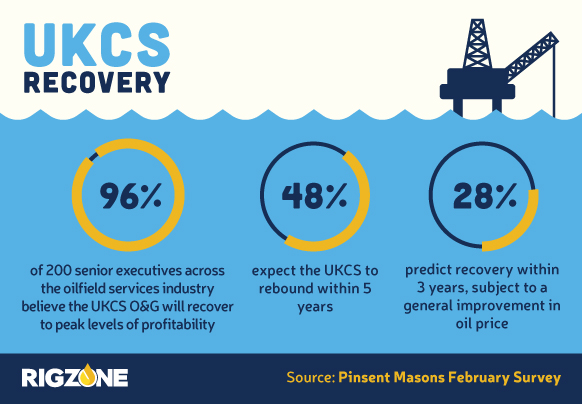Oilfield Services Companies Strive to Survive in North Sea
Oil and gas activity levels are falling across the North Sea, with the upstream industry expected to reduce its spending in the region by billions of dollars this year, according to a recent report from industry body Oil & Gas UK.
This drop in activity is bad news for oilfield services companies who depend on exploration and production firms for work and income.
In an effort to cope with the effects of the lower oil price environment on the North Sea, Technip S.A. is “streamlining [its] business through cost cutting, improving processes and working very close with [its] clients and subcontractors to eliminate non value adding activities,” Knut Boe, president of North Sea Canada at Technip, told Rigzone.
“We can already see that this is working, making previously non-economic projects move again. The fact that we have a very strong backlog helps us through this transition phase to be able to operate in a lower oil price environment,” he added.

The Paris-based engineering company’s focus on cost cutting led to the announcement of 6,000 layoffs in July of last year, which will be implemented by 2017. Boe emphasized, however, that no further staff reductions were scheduled at the time of writing.
“In line with the group’s overall restructuring plan, launched in July 2015, we have restructured our operating centers in Aberdeen, Stavanger and Oslo. No further action of this kind is planned at this stage,” he said.
Technip’s Boe also outlined the importance of preparing for the future as a way of getting through the current industry downturn.
“For us this means helping our clients reduce the cost of their future developments, particularly their lifting costs for projects in the North Sea,” said Boe.
“We strongly believe that alliances, such as the one we have in place with FMC Technologies, including our joint venture named Forsys Subsea, will be the key to future success. Its recent achievements in securing the Statoil Trestakk FEED contract in Norway is hugely encouraging and demonstrates our ability to take the first steps into the new era … We are also committed to working with our peers and clients to achieve much greater levels of standardization that, if fully optimized, should bring significant cost reductions,” Boe added.
Oil and gas engineering and service company Plexus Holdings plc echoed Technip’s tactics in order to survive the industry downturn, turning to cost reduction measures.
“We have embarked on a series of major headcount and cost reduction measures designed to ensure we come through this cycle much leaner but still in a strong position to capitalize on the opportunities that we believe will present themselves when exploration activity picks up,” said Plexus CEO Ben Van Bilderbeek in a statement to Rigzone.
“We have implemented a comprehensive review of our cost base, which importantly has been structured so that it is not at the expense of our long-held commitment to essential [research and development], as we recognize this is key to the long term success of the company. Similarly, we are also mindful to safeguard our core competencies to ensure that when growth returns we are able to meet customer demand at short notice,” Van Bilderbeek added.
Another method Plexus has implemented in order to get through the downturn is focusing its attention on “major petroleum provinces” further afield, such as Asia, Russia and the Middle East.
“In Asia, we have formed a Malaysian joint venture (JV) company, Plexus Products (Asia) Sdn Bhd (PPA), with a local oil and gas partner. Our JV has secured a local PETRONAS license to manufacture and supply POS-GRIP wellhead equipment in Malaysia and also our first order was worth an estimated $1.27 million with Talisman Energy.

“We have also entered into a license agreement with Yantai Jereh Oilfield Services Group Co., Ltd, a world-class supplier of oil and gas field equipment and services. We have signed a similar agreement with two independent Russian oil and gas equipment manufacturers Gusar and Konar, who will rent, manufacture and service our jackup drilling wellhead exploration equipment into the Russian Federation and the other CIS states,” said Van Bilderbeek.
Plexus also pointed out that its expanded equipment range has helped it cope with lower oil prices and revealed that it is investigating other ways to grow its business.
“We have been exploring new avenues of growth including targeting opportunities with national oil companies (NOC) with whom up until now we have had only limited interaction. NOCs have different business models and profiles to international oil companies, which have to date provided the bulk of our business. It is noteworthy that of the $400 billion or so projects that have so far fallen victim to the oil price since late 2014, the majority are those operated by international oil companies. NOCs therefore have the potential to provide a more robust source of business in the current environment.”
Surviving the Downturn through Diversification, Collaboration
Other oilfield services companies operating in the North Sea, such as EPIC International Ltd, have looked at diversifying their portfolio in order to survive the current industry environment.
EPIC’s Managing Director Dave Rowan told Rigzone that his company is trying to add more skills to its roster, which complement the firm’s existing offerings. The organization has looked to build expertise in well services and subsea, an area Rowan said EPIC hasn't worked in before.
In addition to taking measures to make the company “far more cost-effective,” Rowan told Rigzone that EPIC has used a range of other methods to help it through the low oil price, including financial changes and implementing a greater focus on collaboration.

“We have taken other steps, such as changing our bank,” said Rowan. “We have moved to a bank with advisors in Great Yarmouth [where EPIC is located] more used to dealing with companies in the industry, which has secured us better terms and conditions.
“Other strategies include working with other SMEs (small and medium-sized enterprises), either with Memorandums of Understanding or as joint ventures. A wellhead and valve services company has just moved its base from the south coast to our yard and offices. This company’s services complement what we offer. By sharing facilities and working together, operating costs are reduced and, together, we can offer clients a broader range of services,” Rowan added.
Despite all the negative consequences associated with the drop in Brent crude value, Rowan emphasized that the current industry environment wasn’t all bad.
“In some respects, the downturn has generated interest in us as a business because, while operators and asset owners are looking to drive down costs, they view companies of our size as a more cost-effective solution and one that that they might not consider if the oil price was high,” said Rowan.
“The current situation has given us time to look at the market we operate in and investigate different opportunities – something we would not normally do if we were busy with a high oil price. It has offered us a quieter time to reflect and develop the business.
“We have had to lose some people because contracts have gone but, from a support point of view in the office, we have lost no one. In fact, we have increased our staff numbers in the office by 15 percent by looking at new markets in preparation for new opportunities,” he added.
The North Sea Industry "Will Continue for Many Years"
Although Technip, Plexus and EPIC all acknowledge that today’s North Sea environment isn't ideal for oilfield services companies, all firms are optimistic about the future of the region.
Technip’s Boe said he was “confident that the [North Sea] industry will continue to be a major oil and gas region for many years”, but warned that companies “need to take the right actions today”.
Plexus CEO Ben Van Bilderbeek stated that his company has “a positive long term outlook for exploration activity in the North Sea”, which would greatly help services companies operating in the area, and suggested that portions of the region could eventually recover to peak levels of profitability.

EPIC International Managing Director Dave Rowan shared Technip and Plexus’ attitudes towards the North Sea, stating that the region “has always been an attractive place for service companies and will continue to be”. Rowan told Rigzone that “there will always be exploration” in the area, and took comfort in the UK’s scheduled energy plans.
“The Energy Secretary has announced investment in 50 gas-fired power stations. They will need gas from somewhere, and oil will always be needed,” said Rowan.
WHAT DO YOU THINK?
Generated by readers, the comments included herein do not reflect the views and opinions of Rigzone. All comments are subject to editorial review. Off-topic, inappropriate or insulting comments will be removed.
- How Likely Is an All-Out War in the Middle East Involving the USA?
- Rooftop Solar Now 4th Largest Source of Electricity in Australia
- US Confirms Reimposition of Oil Sanctions against Venezuela
- EU, Industry Players Ink Charter to Meet Solar Energy Targets
- Analyst Says USA Influence on Middle East Seems to be Fading
- Russian Ships to Remain Banned from US Ports
- Brazil Court Reinstates Petrobras Chair to Divided Board
- EIB Lends $425.7 Million for Thuringia's Grid Upgrades
- Var Energi Confirms Oil Discovery in Ringhorne
- Seatrium, Shell Strengthen Floating Production Systems Collaboration
- An Already Bad Situation in the Red Sea Just Got Worse
- What's Next for Oil? Analysts Weigh In After Iran's Attack
- USA Regional Banks Dramatically Step Up Loans to Oil and Gas
- EIA Raises WTI Oil Price Forecasts
- How Likely Is an All-Out War in the Middle East Involving the USA?
- Venezuela Authorities Arrest Two Senior Energy Officials
- Namibia Expects FID on Potential Major Oil Discovery by Yearend
- Oil Markets Were Already Positioned for Iran Attack
- Is The Iran Nuclear Deal Revival Project Dead?
- Petrobras Chairman Suspended
- Oil and Gas Executives Predict WTI Oil Price
- An Already Bad Situation in the Red Sea Just Got Worse
- New China Climate Chief Says Fossil Fuels Must Keep a Role
- Oil and Gas Execs Reveal Where They See Henry Hub Price Heading
- Equinor Makes Discovery in North Sea
- Macquarie Strategists Warn of Large Oil Price Correction
- DOI Announces Proposal for Second GOM Offshore Wind Auction
- Standard Chartered Reiterates $94 Brent Call
- Chevron, Hess Confident Embattled Merger Will Close Mid-2024
- Analysts Flag 'Remarkable Feature' of 2024 Oil Price Rally


